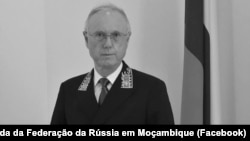“Sudden Russian death syndrome,” a term for a series of sudden strange deaths of Russian diplomats, rekindled again following the death of Moscow’s Mozambique ambassador Alexander Surikov, 68, presumably on May 11, at his residence in Maputo.
Nearly two weeks later, there is no obituary from the Russian foreign ministry or the Kremlin in honor of the veteran diplomat, whom Russian President Vladimir Putin appointed ambassador to Mozambique in 2017.
So far, there a single piece of public information in Russia about Surikov’s death -- a May 12 news report in the Russian state media that uses identical language and cites the Russian foreign ministry. These clone reports seem to have originated from TASS, a state-owned news agency. The news reports are brief and share no details about the circumstances of Surikov’s death.
TASS reported on May 12, that the Russian foreign ministry told the agency:
"Russian Ambassador to Mozambique Surikov suddenly died in Maputo. Preliminary assumption - stroke.”
The claim that Surikov died of a stroke is unsubstantiated.
On May 12, the same day the Russian foreign ministry claimed the “preliminary” cause of Surikov’s death was a stroke, AIM News, Mozambique’s state-owned news agency, reported, citing the PRM (Police of the Republic of Mozambique), that the Russian ambassador’s body was still in “drawer number five” in the morgue of the Maputo Central Hospital.
Moreover, at that time, neither the police nor the hospital’s forensic team had examined the ambassador’s body because the Russian Consul, Yuri Doroshenkov, prohibited any examination or autopsy of the ambassador’s body and gave “clear instructions” to the police “not to touch the body,” AIM News reported citing the PRM.
Because of Surikov’s diplomatic status, Mozambican law enforcement cannot investigate his death without Russian consent.
The police report said that around 11 pm local time, on Saturday, May 11, the “diplomatic police station”, a nickname for Maputo’s 4th Police Station, informed the operational headquarters about a “lifeless body” lying in the Maputo Central Hospital.
By the time the police arrived at the hospital, the record said Surikov’s body was already wrapped in a bag and placed in the morgue’s drawer. Consul Doroshenkov and the embassy’s security officer who guarded the body allowed the police forensic team to take photographs of Surikov’s body bag but declined any further examination, the record said.
Mozambique’s Ministry of Foreign Affairs and Cooperation spokesman José Matsinhe, said on May 13, that the Mozambican government was “working in coordination” with the Russian Embassy in Maputo “to clarify the circumstances surrounding the death of Ambassador Alexander Surikov’’ and “guaranteeing due solemnity in the transfer of the body of the deceased to the Russian Federation.”
The 360 Mozambique news site reported the Public Prosecutor’s office had denied any knowledge of the Russians’ “failure to authorize an autopsy” but confirmed that there was no medical examination on file, and the office's “presumption” was a “sudden death from undetermined causes.”
Thus, a day after the Russian Foreign Ministry told the press that the “preliminary” cause of Surikov’s death was a stroke, both the Mozambican Foreign Ministry and the Public Prosecutor’s office confirmed that the ambassador’s body was still in the Maputo Central Hospital’s morgue, not been examined and the cause of death was not determined.
Russian embassy in Mozambique confirmed that on May 18, Surikov’s body was still in Maputo.
In a Portuguese language post on its Facebook page, the embassy said it held a "farewell ceremony” for ambassador Surikov on May 18, before “the transfer of his body to homeland.”
Surikov is the latest in a long list of Russian diplomats who have died under murky circumstances.
The Diplomatic Courier reported in March 2023, that at least nine senior Russian diplomats died of “sudden Russian death syndrome” between January 2016 and October 2021, including the ambassadors to India, Sudan, and the United Nations.
The Russian foreign ministry said some of those diplomats died of "heart attacks" or "brief illnesses," but in most cases, Moscow never announced the cause of the death.
The foreign ministry’s record of deaths from “heart attack” include, for example, the November 2016 case of Sergei Krivov, a 63-year-old security officer at the Russian consulate in New York City’s Upper East Side. The police found Krivov’s body on the consulate’s floor, unresponsive and with a “blunt force trauma” to his head. Witnesses testified the man fell from the consulate’s roof.
Russia maintained the cause of Krivov’s death was a heart attack, but the NYC medical examiner found no evidence to confirm the man had a heart attack.
Though not a diplomat, Putin’s former senior adviser, Mikhail Lesin, the founder of the Kremlin’s propaganda arm RT, who died in November 2015, in Washington, DC, also had "blunt force injuries to his head, with contributing causes being blunt force injuries of the neck, torso, upper extremities and lower extremities."
A more recent example is the October 2021 death of Kirill Zhalo, a 35-year-old Russian diplomat in Germany.
Zhalo was found dead on the pavement outside the Russian embassy in Berlin, the German capital, presumably fallen out of the upper floor window.
As in the case of Surikov, the Russian embassy refused the autopsy of Zhalo’s body.
Russian media cited the foreign ministry sources initially reporting the cause of death was a heart attack. But the Russian embassy in Berlin said the diplomat died in a "tragic accident."
Exiled Russian journalist Roman Dobrokhotov alleged Zhalo was an undercover secret agent posing as a diplomat and that the FSB executed him on suspicion that he was cooperating with German intelligence.








